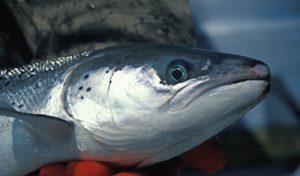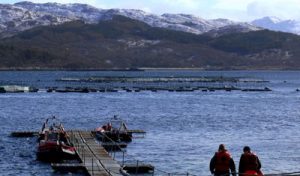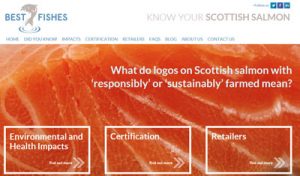 Having submitted evidence[1] to the Scottish Parliament’s Rural Economy and Connectivity (REC) Committee inquiry on salmon farming in Scotland back in May 2018, Fidra’s Best Fishes project welcomes the inquiry’s report[2] released today.
Having submitted evidence[1] to the Scottish Parliament’s Rural Economy and Connectivity (REC) Committee inquiry on salmon farming in Scotland back in May 2018, Fidra’s Best Fishes project welcomes the inquiry’s report[2] released today.
Scottish salmon farming has grown steadily since the 1970’s and is now a major part of Scottish aquaculture which has a present worth of over £1.8bn annually and provides more than 8,000 jobs. Scotland is the largest producer of farmed Atlantic salmon in the EU and the third largest in the world after Norway and Chile.
Salmon farming impacts Scotland environment
While this all seems positive, aquaculture is one of the least compliant sectors regulated by SEPA – the Scottish Environmental Protection Agency (which is currently consulting on its new Aquaculture Sector Plan[3]). Salmon farming can affect the environment in several ways:
- Sea lice – Parasitic crustacean that affects adult phase of salmon: open net pens (ONPs) may contribute to infection of wild fish;
- Chemical release – Pesticides and antibiotics used in ONPs to combat sea lice and other diseases may affect wild marine life especially crustaceans;
- Food waste and faeces – Waste from uneaten food and fish faeces falling through ONPs can create anoxic conditions and affect wild marine habitats and organisms;
- Shooting seals – Farms are licensed to shoot predators including seals, which enter the farms to prey on fish. License conditions do not limit numbers;
- Use of acoustic deterrent devices (ADDs) – ADD use is not restricted by legislation, loses effectiveness over time and can affect cetacean navigation;
- Fish escapes – Damage to ONPs from predators (i.e. seals) and bad weather can result in escaped farmed fish interacting with wild populations;
Investigating the impacts
The publication of the Scottish Aquaculture 2030 Vision for Growth document, at the end of October 2016, resulted in extensive media attention of the issues surrounding Scottish salmon farming. A petition launched by the Salmon and Trout Conservation Trust Scotland led to successive Scottish Parliamentary inquiries into salmon farming. The first was by the Environment Climate Change and Land Reform (ECCLR) committee which published its report in March 2018 and the second by the Rural Economy and Connectivity (REC) committee, just released. The ECCLR committee highlighted these environmental concerns.
Is growth sustainable?
These issues become even more relevant with the projected increase of salmon production in Scotland from 179,000 tonnes in 2014 to 210,000 tonnes in 2020 to 300,000 – 400,000 tonnes in 2030. The latest figure results from a scoping study carried out by the recently established Scottish Aquaculture Innovation Centre (SAIC). While these are viewed as unrealistic targets by some in the industry, it shows the importance being given to the growth of salmon farming in Scotland.
Recognising regulations
The newly released REC Committee report is not light reading at 146 pages and with 65 recommendations, but there are a few things worth picking out at this stage. We are pleased to see recognition by the inquiry that the industry “creates a number of economic, environmental and social challenges for other businesses which rely on the natural environment” and that solutions to address these are essential if the industry is to grow. The report also states that “urgent and meaningful action needs to be taken to address regulatory deficiencies as well as fish health and environmental issues before the industry can expand”. It is regretful that the Committee feels there is insufficient evidence for a moratorium on expansion, especially when it states in relation to Gill Health that it “has difficulty understanding how expansion of the industry can occur if this issue is not satisfactorily resolved”.
Consumers have a right to know where and how their fish is farmed
 Fidra has put forward the case for transparency in the sector. The report contains multiple references to the need for a “platform” or “package of data” with timely data on sea lice, mortality, fish health, welfare, and chemicals and medicines. The committee states that reporting should be through a “comprehensive, accessible” system and publicly available. Fidra feels that the concept of Sustainability Dashboards providing such information to farm level, outlined in recent Best Fishes blogs, will address these recommendations. If retailers also name the farm each salmon product is sourced from on its packaging, consumers will be able to find information easily about their purchase.
Fidra has put forward the case for transparency in the sector. The report contains multiple references to the need for a “platform” or “package of data” with timely data on sea lice, mortality, fish health, welfare, and chemicals and medicines. The committee states that reporting should be through a “comprehensive, accessible” system and publicly available. Fidra feels that the concept of Sustainability Dashboards providing such information to farm level, outlined in recent Best Fishes blogs, will address these recommendations. If retailers also name the farm each salmon product is sourced from on its packaging, consumers will be able to find information easily about their purchase.
Compliance and reporting must be mandatory
We welcome the recommendations that the environmental impact of all medicines used should be considered and reviewed (including Emamectin Benzoate). Fidra agrees that compliance and reporting need to be a mandatory requirement with penalties that are robust and enforceable. We support moves to bring legislation in line with accreditation which has more stretching environmental standards. Fidra has found data and information on farms, but information on accreditation should be simpler and easier for consumers to understand. Other report recommendations include a review of the use of cleaner fish, the application of the precautionary approach in siting of new fish farms adjacent to wild salmon rivers and a review of the use of Acoustic Deterrent Devices to manage seal interactions.
Fidra wants to see recommendations swiftly implemented
Fidra will be reviewing the report in detail and advocating for the strong enforcement and application of the recommendations by the Scottish Government. In the meantime you can carefully consider how much information is available on your salmon before you buy it, and find out more by visiting our Best Fishes website.

[1] http://www.parliament.scot/parliamentarybusiness/CurrentCommittees/108008.aspx
[2] https://digitalpublications.parliament.scot/Committees/Report/REC/2018/11/27/Salmon-farming-in-Scotland
[3] https://consultation.sepa.org.uk/sector-plan/finfishaquaculture/
